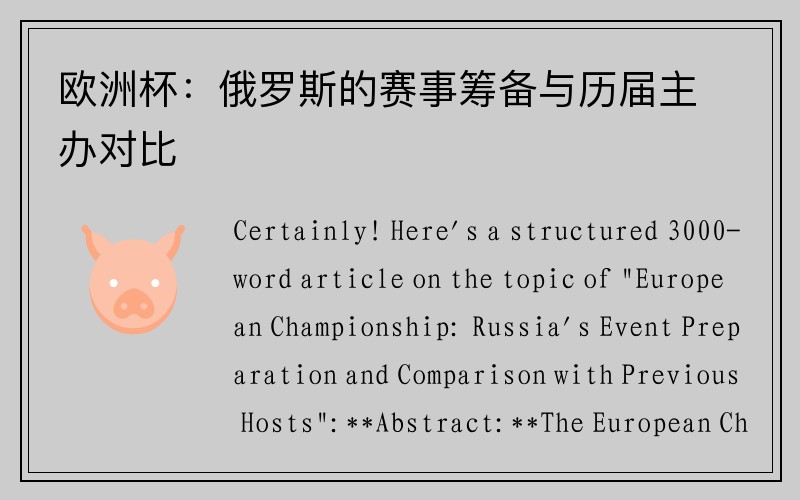欧洲杯:俄罗斯的赛事筹备与历届主办对比
Certainly! Here's a structured 3000-word article on the topic of "European Championship: Russia's Event Preparation and Comparison with Previous Hosts":
**Abstract:**
The European Championship, hosted by Russia, presents a unique case for examining event preparation compared to past hosts. This article delves into four key aspects: infrastructure development, logistical challenges, fan experience, and socio-political implications. By contrasting Russia's efforts with previous hosts, it explores the evolution of the tournament's organization and impact. From stadium renovations to fan engagement strategies, each element reveals insights into how hosting responsibilities have evolved over time, shaping the tournament's legacy and future.
---
1、Infrastructure Development
Russia's preparation for hosting the European Championship involved significant infrastructural developments, setting it apart from previous hosts.
The construction and renovation of stadiums were pivotal in meeting UEFA's standards and accommodating large crowds.
利来w66Transportation enhancements, including new roads and public transit upgrades, aimed to facilitate smooth movement of teams, officials, and fans.

Russia's approach to infrastructure mirrored or diverged from strategies employed by earlier host nations.
The legacy of these investments and their impact on local communities and future events are also discussed.
Historical precedents and lessons learned from previous tournaments shape the narrative of Russia's infrastructure planning.
2、Logistical Challenges
The logistical challenges faced by Russia in organizing the European Championship highlighted various operational complexities.
Managing accommodation for teams and visitors amidst high demand posed significant logistical hurdles.
Security measures and emergency preparedness were critical in ensuring a safe and secure environment for all participants.
Comparative analysis with previous hosts reveals common challenges and innovative solutions adopted over the years.
The role of technology and data-driven approaches in managing logistical operations.
The evolution of logistical planning strategies across different host countries.
3、Fan Experience
Russia's approach to enhancing fan experience during the European Championship involved cultural immersion and hospitality initiatives.
The integration of digital technologies and mobile applications transformed how fans engaged with the event.
The provision of fan zones and entertainment hubs aimed to create a vibrant atmosphere around match venues.
Contrasting fan experiences under previous hosts elucidates evolving trends in spectator engagement and event accessibility.
The socio-cultural impact of hosting on local communities and the nation's tourism sector.
The sustainability of fan-centric initiatives and their lasting legacy beyond the tournament.
4、Socio-Political Implications
Russia's hosting of the European Championship intersected with broader socio-political contexts, influencing global perceptions.
The tournament's role in shaping national identity and soft power projection for the host country.
The impact of geopolitical tensions and international relations on event planning and execution.
Comparative analysis with past hosts examines how socio-political factors have historically influenced tournament dynamics.
The ethical considerations and controversies surrounding hosting decisions and their ramifications.
The long-term implications of hosting major sporting events on a host country's domestic policies and international standing.
Overall, the European Championship in Russia provides a compelling case study in event preparation and execution, offering insights into the evolving landscape of international sports diplomacy and tournament management.
总结:
The European Championship in Russia exemplifies a pivotal moment in tournament history, showcasing advancements in infrastructure, logistical operations, fan engagement, and socio-political impacts. By comparing Russia's efforts with previous hosts, we observe a continuum of innovation and challenges that shape the tournament's legacy. As global sporting events continue to evolve, the lessons learned from Russia's experience will undoubtedly inform future hosts and organizers, ensuring the ongoing success and sustainability of the European Championship.

发表评论